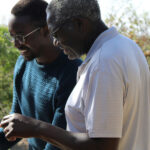A friend of mine has written an article arguing that numbers shouldn’t be the metric of church success. You should read his article; he’s quite right. But as he closes, he acknowledges that just because numbers can’t tell us the health of our church, that doesn’t mean we should lock up the spreadsheet and throw away the key. For Jesus said the harvest is plentiful (Matthew 9:37). Numbers or metrics can be very useful in approaching the harvest fields nearby, which God is sending us into.
Of course, after saying that the harvest is plentiful, Jesus adds something most of those in ministry can agree on: the workers are few. The task is immense, sometimes overwhelming. And this should lead us to dependence on the Lord to send more workers, which is the thought in the very next verse (Matthew 9:38). That dependence should carry over into all aspects of our work: we should be reliant on the Lord to help us in the harvest.
When faced with a task far beyond us, we should consider our limited resources wisely.
And yet, we’re still weak. In Tolkien’s Fellowship of the Ring, Bilbo Baggins says that he feels like butter scraped over too much bread. It’s a good picture of our human limitation—even spoken by a Hobbit. God could’ve sent angels to proclaim the gospel; instead, he privileges fallen and feeble men and women to the task. And we feel that keenly: we often don’t know where to start, where to direct resources, leaders, or even our prayers.
Prudence tells us that when faced with a task far beyond us, we should consider our limited resources wisely, all the while depending on God. Keeping track of the numbers can help us to focus our ministry efforts as we ask some key questions.
Who Can We Reach?
It is true that we are called to go and make disciples of all nations: to evangelise the world, to share the good news of Jesus Christ with all people, everywhere (Matthew 28:18-20). However, it’s unlikely that your local church is going to be able to achieve this entire mission solo. Every local church is part of the much larger body of Christ, the head of the body, who is working through his people to accomplish his purposes.
It’s unlikely that your local church is going to be able to achieve the Great Commission solo.
This means that you should expect Christ to use your church for his kingdom. In fact, he has placed you right where you are, with unique gifts and opportunities. So look around! We can use the numbers to help answer the question: Who is around me that needs to hear the gospel?
Look at the demographics of your neighbourhood and consider who you can reach. Ask local government or local businesses for their insights. Ask your church; your neighbours. Take a walk and make some notes. Paul went to natural gathering places when he came into a new city (Acts 17:2). You can do the same.
We’ll speak about what to do with this information in our third point. But the next question to ask is: “Who are we reaching?”
Who Are We Reaching?
One way my church serves the neighbourhood around us is to run a holiday club for children. The goal is to serve families in our neighbourhood, introduce them to the church, and over time, bring people to faith. By keeping track of who attends, we can get an idea of who we are reaching through this ministry and can gauge whether we are actually having an impact in our neighbourhood.
There are many ministries where it’s possible to get some kind of general statistics, even if you’re not running a holiday club with a sign-in sheet. It’s often natural to ask newcomers to a Sunday service where they’re from and if they’ve been to church before. Keep note of who is visiting you and from where. If you have a church directory, you may already have this information about your church members.
Pray specifically for the areas of greatest need in your church.
Don’t leave this information mouldering in a Google sheet or drawer. Dig it up and use it for the kingdom! Look at who you’re reaching. Ask how you can serve them better. Perhaps your church has 20 young adults, but no Bible study for them. This information can help you put resources towards areas of specific need, and help you to pray specifically for the areas of greatest need in your church.
Keeping track of that information can tell you who you’re reaching with the gospel. By taking who you can reach, and subtracting who you are reaching already, you’re left with where you can grow.
Where Can We Grow?
The harvest is massive and the workers are few. So we should expect to find ourselves surrounded by an overwhelming need for the gospel. Which, of course, we do. But remember that we have a powerful God. Trusting him we should eagerly and wisely pursue gospel opportunities around us (Ephesians 3:20).
Once you’ve answered who you can reach and who you are reaching (questions to revisit regularly), you can then ask: how can we equip ourselves to reach those around us that we’re not currently able to reach?
Trusting God we should eagerly and wisely pursue gospel opportunities around us.
Perhaps you’ll find there’s a particular cultural group in your neighbourhood that you’re not reaching. Can you build relationships and learn how to share the gospel with them? Maybe you discover a particular demographic isn’t being reached. There are many families moving into your neighbourhood. Perhaps you could begin a ministry for children and youth, or start a series equipping parents.
It’s worth adding a caveat. We started our first point by saying that it’s unlikely that your local church can fulfil Jesus’ mission solo. Will your church be effective at reaching everyone around you and fulfilling every need? Probably not. You may not even be equipped to reach everyone around you. But this simply means that it’s time for more two questions:
- Who can we send (even out from among ourselves)?
- Who can we support, to meet this need?
Perhaps the need is so great that you’ll need to consider a church plant, in which case having a good grasp of the needs of your local area will be incredibly helpful.
All this being said, these are questions that we can only ask when we’re aware of the particular needs all around us that only Christ can meet. This is where the numbers can point us to the harvest. Because, ultimately, it’s about the gospel, not the numbers.
It’s About the Gospel, Not Numbers
Let’s sum it all up. We’re only a few workers in the midst of a plentiful harvest. We trust in the Lord of the harvest to send workers to help us, and to help us in our work as we serve him. But we’re not to simply rush blindly into the fray. God has given us numbers as tools that can help us answer three key questions: who can we reach, who are we reaching, and, where can we grow?
God has given us numbers as tools that can help us.
The first question encourages us to look outside of the church to the needs of the community around us. The second question reminds us to engage with the ministries within our church to see where we should allocate resources, leaders, and how to direct our prayers. The final question reminds us to seek gospel growth where we are not yet reaching people for Christ, and to ask how we can best aim for gospel growth.
Numbers alone don’t define our success, but tracking and analysing them, even on a very basic level, can provide us with valuable insights that can help us focus our efforts and grow God’s kingdom, for his glory.














